Entrepreneurship and Small Business Management Report - LO1-LO4
VerifiedAdded on 2023/01/19
|17
|4615
|91
Report
AI Summary
This report provides a comprehensive overview of entrepreneurship and small business management, covering key concepts and practical applications. It begins with definitions of entrepreneurship, entrepreneurial activity, and enterprise, differentiating between entrepreneurs, owner-managers, and serial entrepreneurs, and exploring various types of entrepreneurship including social enterprises. The report delves into entrepreneurial ideas, emphasizing their significance and role of small firms in the economy, along with international aspects of entrepreneurship. It further examines the characteristics, skills, and traits of successful entrepreneurs, including personality aspects that reflect an entrepreneurial mindset. Finally, it covers the backgrounds and experiences that influence entrepreneurial success. The report also includes an analysis of data and statistics related to small businesses in the UK market.

Entrepreneurship and
Small Business
Management
Small Business
Management
Paraphrase This Document
Need a fresh take? Get an instant paraphrase of this document with our AI Paraphraser
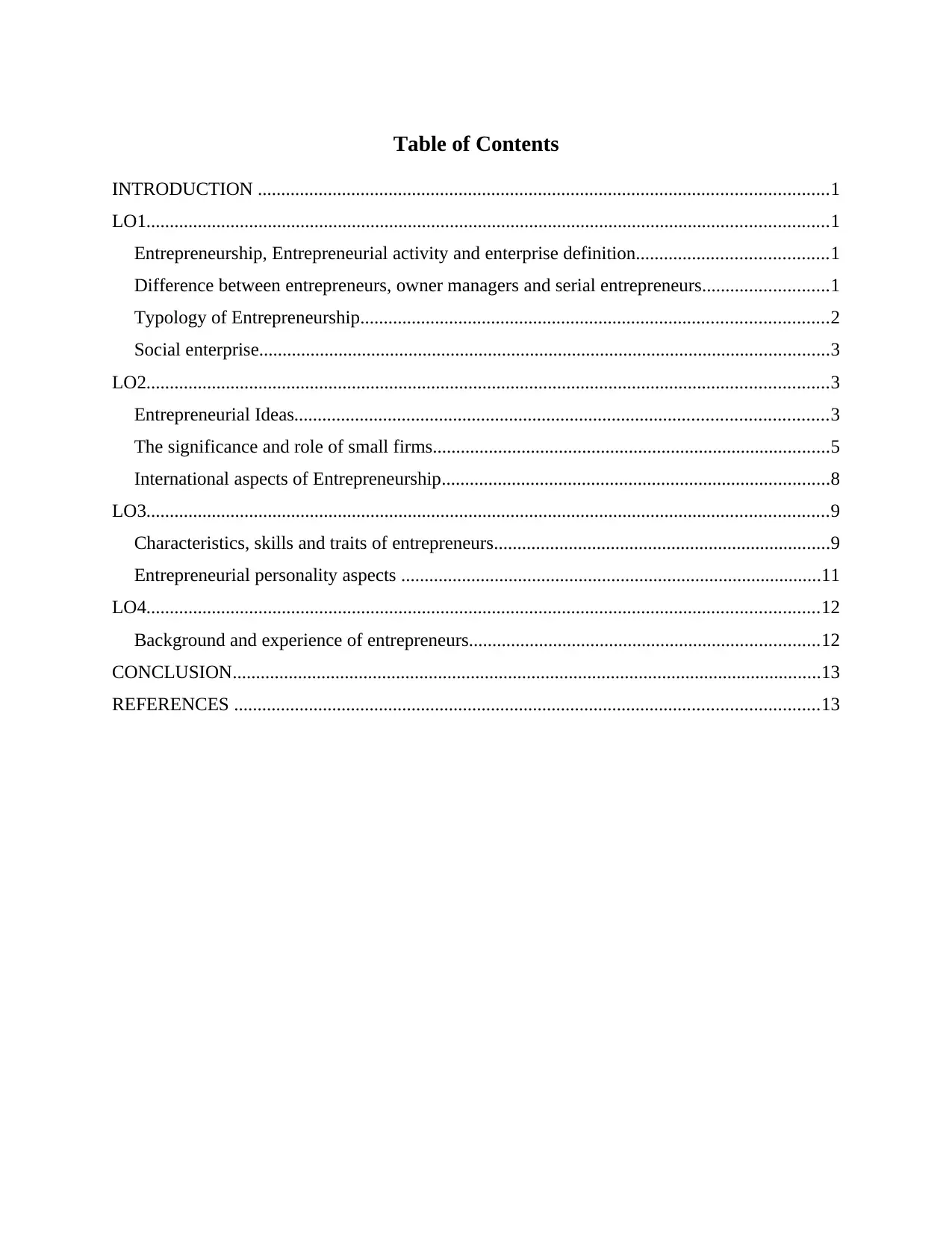
Table of Contents
INTRODUCTION ..........................................................................................................................1
LO1..................................................................................................................................................1
Entrepreneurship, Entrepreneurial activity and enterprise definition.........................................1
Difference between entrepreneurs, owner managers and serial entrepreneurs...........................1
Typology of Entrepreneurship....................................................................................................2
Social enterprise..........................................................................................................................3
LO2..................................................................................................................................................3
Entrepreneurial Ideas..................................................................................................................3
The significance and role of small firms.....................................................................................5
International aspects of Entrepreneurship...................................................................................8
LO3..................................................................................................................................................9
Characteristics, skills and traits of entrepreneurs........................................................................9
Entrepreneurial personality aspects ..........................................................................................11
LO4................................................................................................................................................12
Background and experience of entrepreneurs...........................................................................12
CONCLUSION..............................................................................................................................13
REFERENCES .............................................................................................................................13
INTRODUCTION ..........................................................................................................................1
LO1..................................................................................................................................................1
Entrepreneurship, Entrepreneurial activity and enterprise definition.........................................1
Difference between entrepreneurs, owner managers and serial entrepreneurs...........................1
Typology of Entrepreneurship....................................................................................................2
Social enterprise..........................................................................................................................3
LO2..................................................................................................................................................3
Entrepreneurial Ideas..................................................................................................................3
The significance and role of small firms.....................................................................................5
International aspects of Entrepreneurship...................................................................................8
LO3..................................................................................................................................................9
Characteristics, skills and traits of entrepreneurs........................................................................9
Entrepreneurial personality aspects ..........................................................................................11
LO4................................................................................................................................................12
Background and experience of entrepreneurs...........................................................................12
CONCLUSION..............................................................................................................................13
REFERENCES .............................................................................................................................13
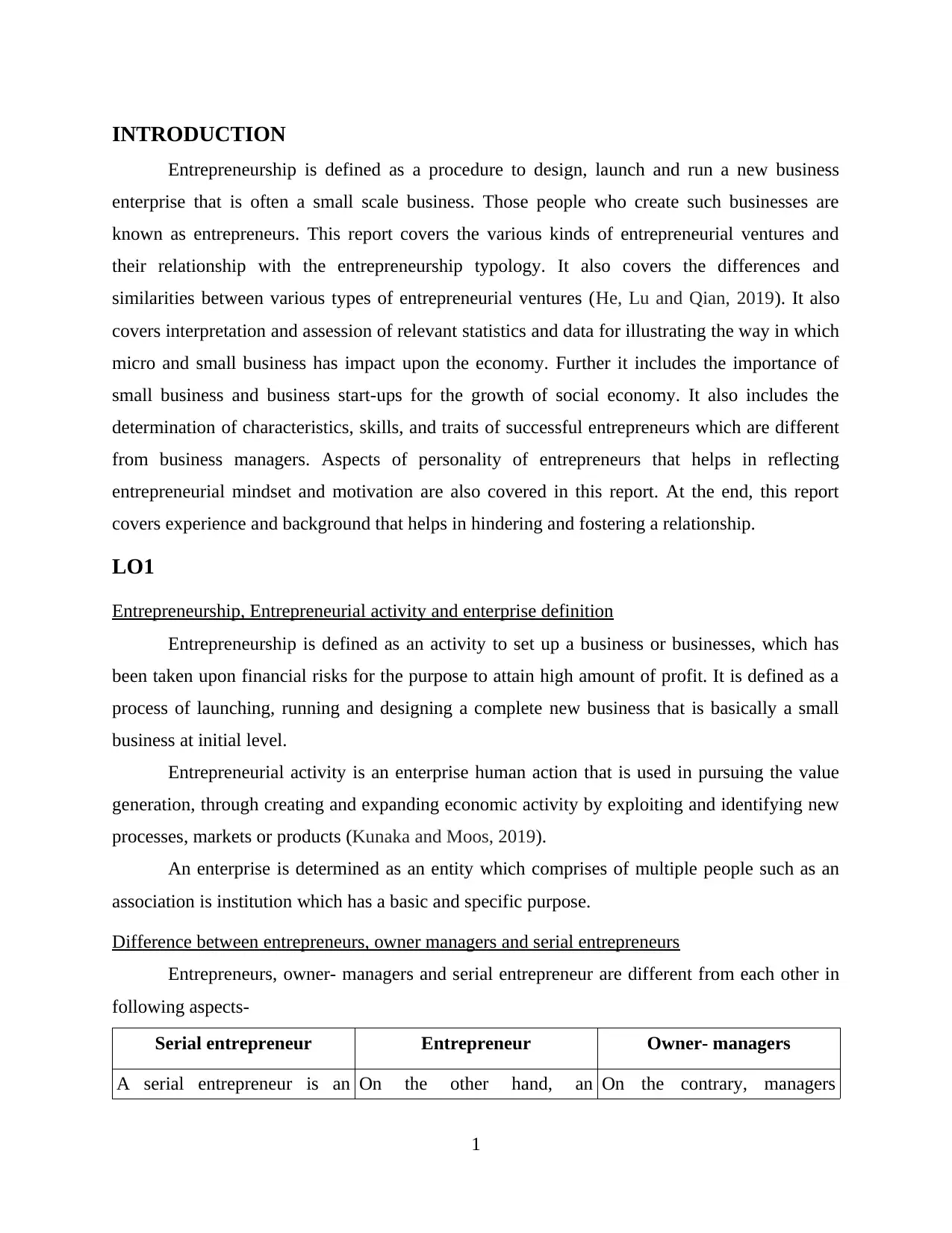
INTRODUCTION
Entrepreneurship is defined as a procedure to design, launch and run a new business
enterprise that is often a small scale business. Those people who create such businesses are
known as entrepreneurs. This report covers the various kinds of entrepreneurial ventures and
their relationship with the entrepreneurship typology. It also covers the differences and
similarities between various types of entrepreneurial ventures (He, Lu and Qian, 2019). It also
covers interpretation and assession of relevant statistics and data for illustrating the way in which
micro and small business has impact upon the economy. Further it includes the importance of
small business and business start-ups for the growth of social economy. It also includes the
determination of characteristics, skills, and traits of successful entrepreneurs which are different
from business managers. Aspects of personality of entrepreneurs that helps in reflecting
entrepreneurial mindset and motivation are also covered in this report. At the end, this report
covers experience and background that helps in hindering and fostering a relationship.
LO1
Entrepreneurship, Entrepreneurial activity and enterprise definition
Entrepreneurship is defined as an activity to set up a business or businesses, which has
been taken upon financial risks for the purpose to attain high amount of profit. It is defined as a
process of launching, running and designing a complete new business that is basically a small
business at initial level.
Entrepreneurial activity is an enterprise human action that is used in pursuing the value
generation, through creating and expanding economic activity by exploiting and identifying new
processes, markets or products (Kunaka and Moos, 2019).
An enterprise is determined as an entity which comprises of multiple people such as an
association is institution which has a basic and specific purpose.
Difference between entrepreneurs, owner managers and serial entrepreneurs
Entrepreneurs, owner- managers and serial entrepreneur are different from each other in
following aspects-
Serial entrepreneur Entrepreneur Owner- managers
A serial entrepreneur is an On the other hand, an On the contrary, managers
1
Entrepreneurship is defined as a procedure to design, launch and run a new business
enterprise that is often a small scale business. Those people who create such businesses are
known as entrepreneurs. This report covers the various kinds of entrepreneurial ventures and
their relationship with the entrepreneurship typology. It also covers the differences and
similarities between various types of entrepreneurial ventures (He, Lu and Qian, 2019). It also
covers interpretation and assession of relevant statistics and data for illustrating the way in which
micro and small business has impact upon the economy. Further it includes the importance of
small business and business start-ups for the growth of social economy. It also includes the
determination of characteristics, skills, and traits of successful entrepreneurs which are different
from business managers. Aspects of personality of entrepreneurs that helps in reflecting
entrepreneurial mindset and motivation are also covered in this report. At the end, this report
covers experience and background that helps in hindering and fostering a relationship.
LO1
Entrepreneurship, Entrepreneurial activity and enterprise definition
Entrepreneurship is defined as an activity to set up a business or businesses, which has
been taken upon financial risks for the purpose to attain high amount of profit. It is defined as a
process of launching, running and designing a complete new business that is basically a small
business at initial level.
Entrepreneurial activity is an enterprise human action that is used in pursuing the value
generation, through creating and expanding economic activity by exploiting and identifying new
processes, markets or products (Kunaka and Moos, 2019).
An enterprise is determined as an entity which comprises of multiple people such as an
association is institution which has a basic and specific purpose.
Difference between entrepreneurs, owner managers and serial entrepreneurs
Entrepreneurs, owner- managers and serial entrepreneur are different from each other in
following aspects-
Serial entrepreneur Entrepreneur Owner- managers
A serial entrepreneur is an On the other hand, an On the contrary, managers
1
⊘ This is a preview!⊘
Do you want full access?
Subscribe today to unlock all pages.

Trusted by 1+ million students worldwide
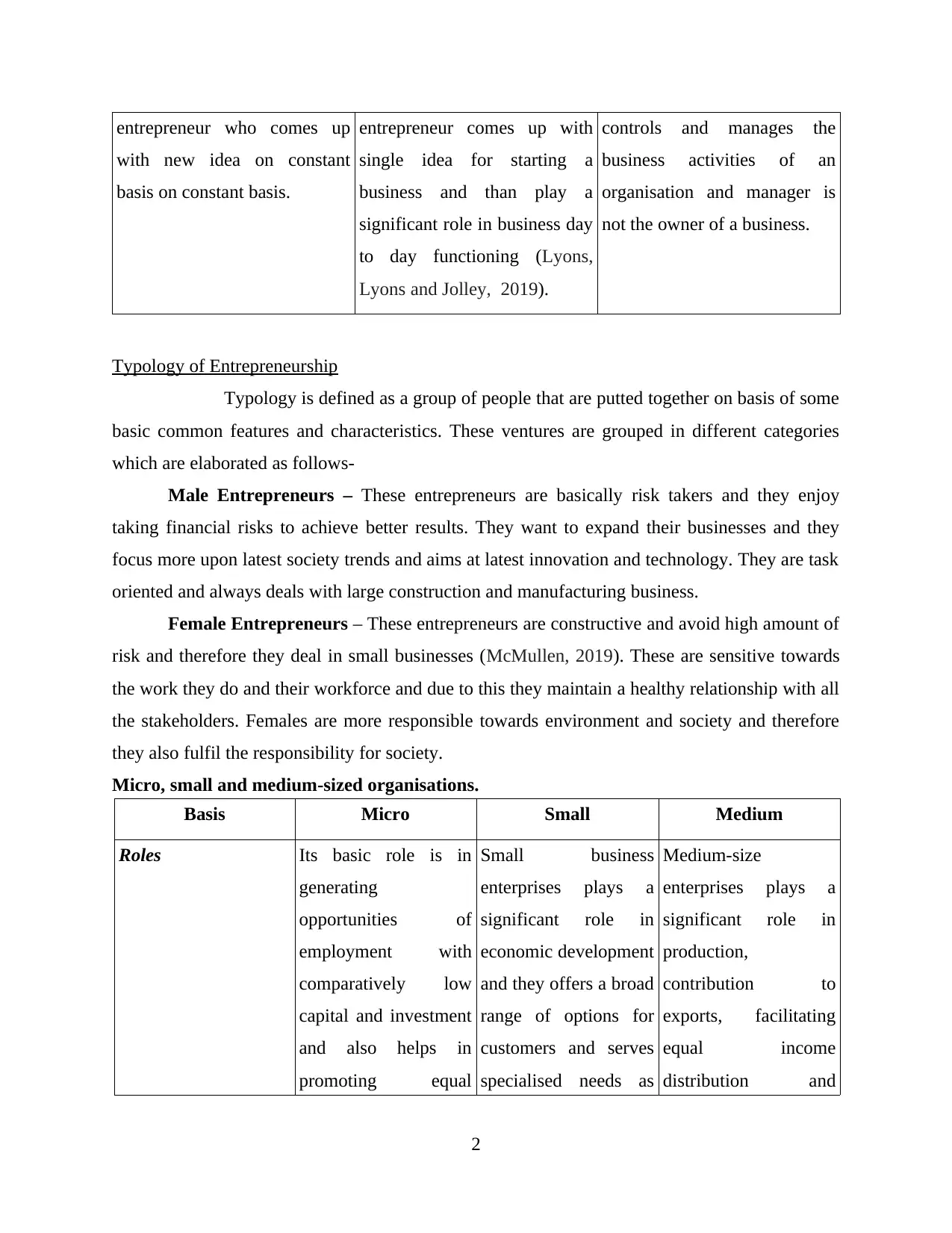
entrepreneur who comes up
with new idea on constant
basis on constant basis.
entrepreneur comes up with
single idea for starting a
business and than play a
significant role in business day
to day functioning (Lyons,
Lyons and Jolley, 2019).
controls and manages the
business activities of an
organisation and manager is
not the owner of a business.
Typology of Entrepreneurship
Typology is defined as a group of people that are putted together on basis of some
basic common features and characteristics. These ventures are grouped in different categories
which are elaborated as follows-
Male Entrepreneurs – These entrepreneurs are basically risk takers and they enjoy
taking financial risks to achieve better results. They want to expand their businesses and they
focus more upon latest society trends and aims at latest innovation and technology. They are task
oriented and always deals with large construction and manufacturing business.
Female Entrepreneurs – These entrepreneurs are constructive and avoid high amount of
risk and therefore they deal in small businesses (McMullen, 2019). These are sensitive towards
the work they do and their workforce and due to this they maintain a healthy relationship with all
the stakeholders. Females are more responsible towards environment and society and therefore
they also fulfil the responsibility for society.
Micro, small and medium-sized organisations.
Basis Micro Small Medium
Roles Its basic role is in
generating
opportunities of
employment with
comparatively low
capital and investment
and also helps in
promoting equal
Small business
enterprises plays a
significant role in
economic development
and they offers a broad
range of options for
customers and serves
specialised needs as
Medium-size
enterprises plays a
significant role in
production,
contribution to
exports, facilitating
equal income
distribution and
2
with new idea on constant
basis on constant basis.
entrepreneur comes up with
single idea for starting a
business and than play a
significant role in business day
to day functioning (Lyons,
Lyons and Jolley, 2019).
controls and manages the
business activities of an
organisation and manager is
not the owner of a business.
Typology of Entrepreneurship
Typology is defined as a group of people that are putted together on basis of some
basic common features and characteristics. These ventures are grouped in different categories
which are elaborated as follows-
Male Entrepreneurs – These entrepreneurs are basically risk takers and they enjoy
taking financial risks to achieve better results. They want to expand their businesses and they
focus more upon latest society trends and aims at latest innovation and technology. They are task
oriented and always deals with large construction and manufacturing business.
Female Entrepreneurs – These entrepreneurs are constructive and avoid high amount of
risk and therefore they deal in small businesses (McMullen, 2019). These are sensitive towards
the work they do and their workforce and due to this they maintain a healthy relationship with all
the stakeholders. Females are more responsible towards environment and society and therefore
they also fulfil the responsibility for society.
Micro, small and medium-sized organisations.
Basis Micro Small Medium
Roles Its basic role is in
generating
opportunities of
employment with
comparatively low
capital and investment
and also helps in
promoting equal
Small business
enterprises plays a
significant role in
economic development
and they offers a broad
range of options for
customers and serves
specialised needs as
Medium-size
enterprises plays a
significant role in
production,
contribution to
exports, facilitating
equal income
distribution and
2
Paraphrase This Document
Need a fresh take? Get an instant paraphrase of this document with our AI Paraphraser
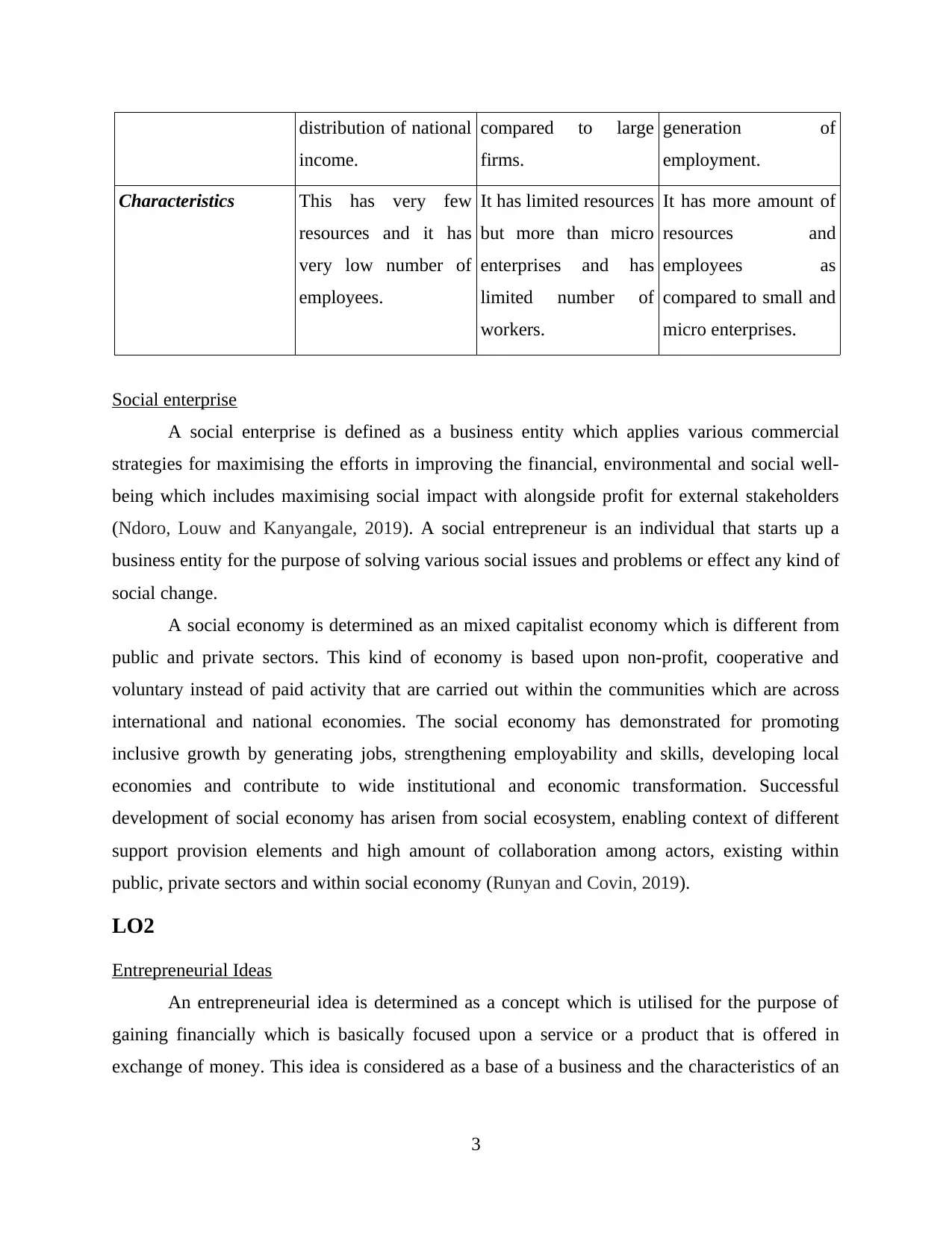
distribution of national
income.
compared to large
firms.
generation of
employment.
Characteristics This has very few
resources and it has
very low number of
employees.
It has limited resources
but more than micro
enterprises and has
limited number of
workers.
It has more amount of
resources and
employees as
compared to small and
micro enterprises.
Social enterprise
A social enterprise is defined as a business entity which applies various commercial
strategies for maximising the efforts in improving the financial, environmental and social well-
being which includes maximising social impact with alongside profit for external stakeholders
(Ndoro, Louw and Kanyangale, 2019). A social entrepreneur is an individual that starts up a
business entity for the purpose of solving various social issues and problems or effect any kind of
social change.
A social economy is determined as an mixed capitalist economy which is different from
public and private sectors. This kind of economy is based upon non-profit, cooperative and
voluntary instead of paid activity that are carried out within the communities which are across
international and national economies. The social economy has demonstrated for promoting
inclusive growth by generating jobs, strengthening employability and skills, developing local
economies and contribute to wide institutional and economic transformation. Successful
development of social economy has arisen from social ecosystem, enabling context of different
support provision elements and high amount of collaboration among actors, existing within
public, private sectors and within social economy (Runyan and Covin, 2019).
LO2
Entrepreneurial Ideas
An entrepreneurial idea is determined as a concept which is utilised for the purpose of
gaining financially which is basically focused upon a service or a product that is offered in
exchange of money. This idea is considered as a base of a business and the characteristics of an
3
income.
compared to large
firms.
generation of
employment.
Characteristics This has very few
resources and it has
very low number of
employees.
It has limited resources
but more than micro
enterprises and has
limited number of
workers.
It has more amount of
resources and
employees as
compared to small and
micro enterprises.
Social enterprise
A social enterprise is defined as a business entity which applies various commercial
strategies for maximising the efforts in improving the financial, environmental and social well-
being which includes maximising social impact with alongside profit for external stakeholders
(Ndoro, Louw and Kanyangale, 2019). A social entrepreneur is an individual that starts up a
business entity for the purpose of solving various social issues and problems or effect any kind of
social change.
A social economy is determined as an mixed capitalist economy which is different from
public and private sectors. This kind of economy is based upon non-profit, cooperative and
voluntary instead of paid activity that are carried out within the communities which are across
international and national economies. The social economy has demonstrated for promoting
inclusive growth by generating jobs, strengthening employability and skills, developing local
economies and contribute to wide institutional and economic transformation. Successful
development of social economy has arisen from social ecosystem, enabling context of different
support provision elements and high amount of collaboration among actors, existing within
public, private sectors and within social economy (Runyan and Covin, 2019).
LO2
Entrepreneurial Ideas
An entrepreneurial idea is determined as a concept which is utilised for the purpose of
gaining financially which is basically focused upon a service or a product that is offered in
exchange of money. This idea is considered as a base of a business and the characteristics of an
3
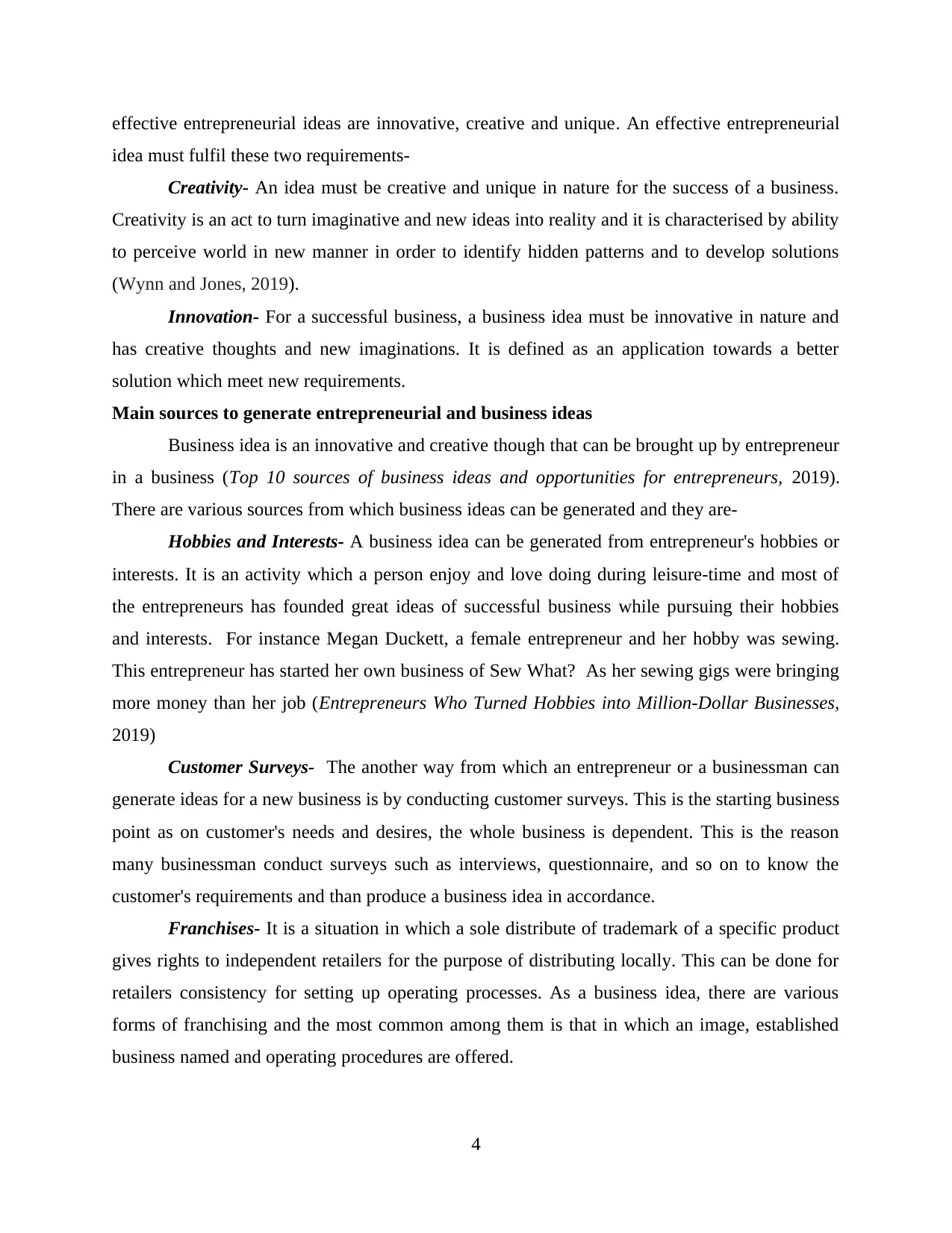
effective entrepreneurial ideas are innovative, creative and unique. An effective entrepreneurial
idea must fulfil these two requirements-
Creativity- An idea must be creative and unique in nature for the success of a business.
Creativity is an act to turn imaginative and new ideas into reality and it is characterised by ability
to perceive world in new manner in order to identify hidden patterns and to develop solutions
(Wynn and Jones, 2019).
Innovation- For a successful business, a business idea must be innovative in nature and
has creative thoughts and new imaginations. It is defined as an application towards a better
solution which meet new requirements.
Main sources to generate entrepreneurial and business ideas
Business idea is an innovative and creative though that can be brought up by entrepreneur
in a business (Top 10 sources of business ideas and opportunities for entrepreneurs, 2019).
There are various sources from which business ideas can be generated and they are-
Hobbies and Interests- A business idea can be generated from entrepreneur's hobbies or
interests. It is an activity which a person enjoy and love doing during leisure-time and most of
the entrepreneurs has founded great ideas of successful business while pursuing their hobbies
and interests. For instance Megan Duckett, a female entrepreneur and her hobby was sewing.
This entrepreneur has started her own business of Sew What? As her sewing gigs were bringing
more money than her job (Entrepreneurs Who Turned Hobbies into Million-Dollar Businesses,
2019)
Customer Surveys- The another way from which an entrepreneur or a businessman can
generate ideas for a new business is by conducting customer surveys. This is the starting business
point as on customer's needs and desires, the whole business is dependent. This is the reason
many businessman conduct surveys such as interviews, questionnaire, and so on to know the
customer's requirements and than produce a business idea in accordance.
Franchises- It is a situation in which a sole distribute of trademark of a specific product
gives rights to independent retailers for the purpose of distributing locally. This can be done for
retailers consistency for setting up operating processes. As a business idea, there are various
forms of franchising and the most common among them is that in which an image, established
business named and operating procedures are offered.
4
idea must fulfil these two requirements-
Creativity- An idea must be creative and unique in nature for the success of a business.
Creativity is an act to turn imaginative and new ideas into reality and it is characterised by ability
to perceive world in new manner in order to identify hidden patterns and to develop solutions
(Wynn and Jones, 2019).
Innovation- For a successful business, a business idea must be innovative in nature and
has creative thoughts and new imaginations. It is defined as an application towards a better
solution which meet new requirements.
Main sources to generate entrepreneurial and business ideas
Business idea is an innovative and creative though that can be brought up by entrepreneur
in a business (Top 10 sources of business ideas and opportunities for entrepreneurs, 2019).
There are various sources from which business ideas can be generated and they are-
Hobbies and Interests- A business idea can be generated from entrepreneur's hobbies or
interests. It is an activity which a person enjoy and love doing during leisure-time and most of
the entrepreneurs has founded great ideas of successful business while pursuing their hobbies
and interests. For instance Megan Duckett, a female entrepreneur and her hobby was sewing.
This entrepreneur has started her own business of Sew What? As her sewing gigs were bringing
more money than her job (Entrepreneurs Who Turned Hobbies into Million-Dollar Businesses,
2019)
Customer Surveys- The another way from which an entrepreneur or a businessman can
generate ideas for a new business is by conducting customer surveys. This is the starting business
point as on customer's needs and desires, the whole business is dependent. This is the reason
many businessman conduct surveys such as interviews, questionnaire, and so on to know the
customer's requirements and than produce a business idea in accordance.
Franchises- It is a situation in which a sole distribute of trademark of a specific product
gives rights to independent retailers for the purpose of distributing locally. This can be done for
retailers consistency for setting up operating processes. As a business idea, there are various
forms of franchising and the most common among them is that in which an image, established
business named and operating procedures are offered.
4
⊘ This is a preview!⊘
Do you want full access?
Subscribe today to unlock all pages.

Trusted by 1+ million students worldwide
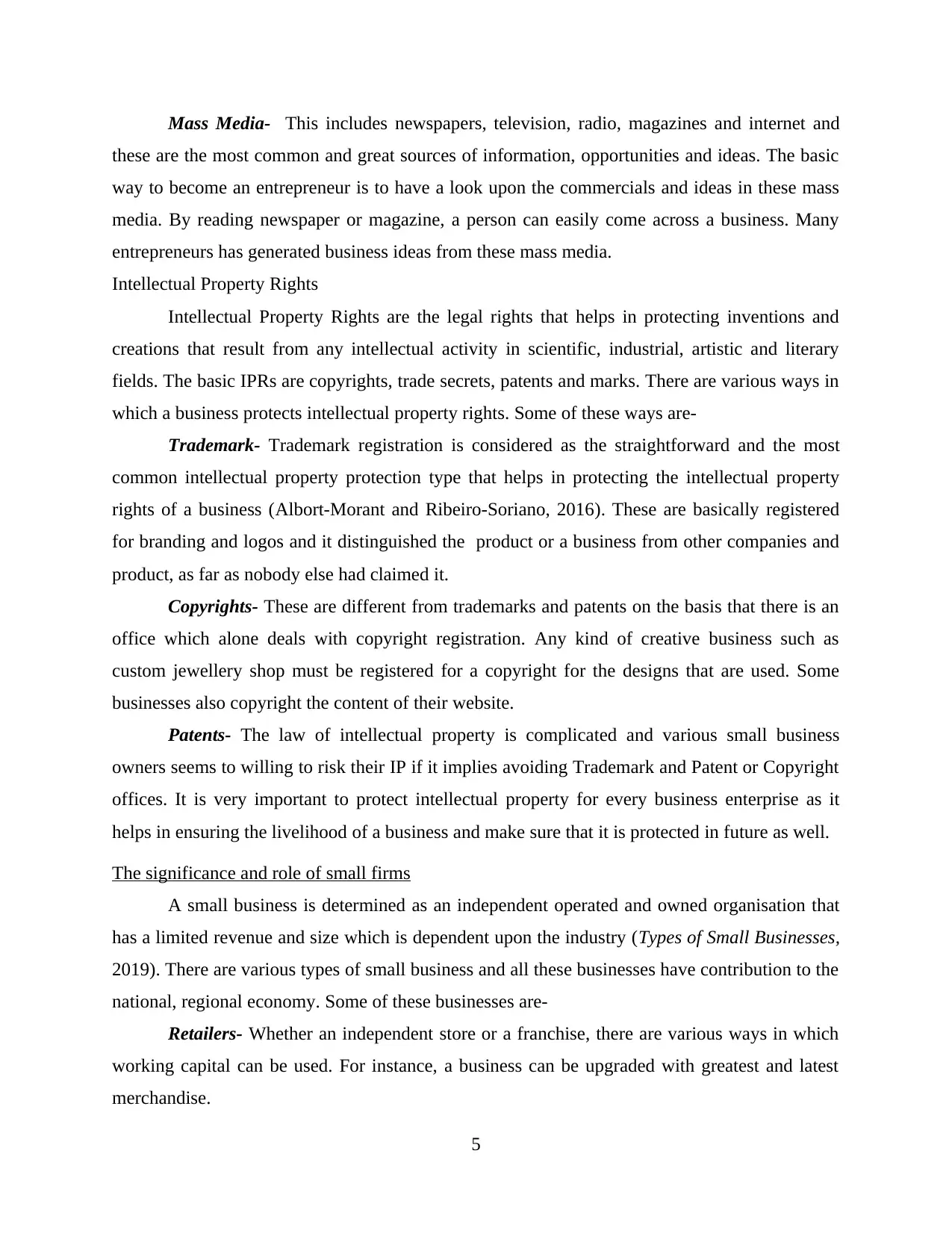
Mass Media- This includes newspapers, television, radio, magazines and internet and
these are the most common and great sources of information, opportunities and ideas. The basic
way to become an entrepreneur is to have a look upon the commercials and ideas in these mass
media. By reading newspaper or magazine, a person can easily come across a business. Many
entrepreneurs has generated business ideas from these mass media.
Intellectual Property Rights
Intellectual Property Rights are the legal rights that helps in protecting inventions and
creations that result from any intellectual activity in scientific, industrial, artistic and literary
fields. The basic IPRs are copyrights, trade secrets, patents and marks. There are various ways in
which a business protects intellectual property rights. Some of these ways are-
Trademark- Trademark registration is considered as the straightforward and the most
common intellectual property protection type that helps in protecting the intellectual property
rights of a business (Albort-Morant and Ribeiro-Soriano, 2016). These are basically registered
for branding and logos and it distinguished the product or a business from other companies and
product, as far as nobody else had claimed it.
Copyrights- These are different from trademarks and patents on the basis that there is an
office which alone deals with copyright registration. Any kind of creative business such as
custom jewellery shop must be registered for a copyright for the designs that are used. Some
businesses also copyright the content of their website.
Patents- The law of intellectual property is complicated and various small business
owners seems to willing to risk their IP if it implies avoiding Trademark and Patent or Copyright
offices. It is very important to protect intellectual property for every business enterprise as it
helps in ensuring the livelihood of a business and make sure that it is protected in future as well.
The significance and role of small firms
A small business is determined as an independent operated and owned organisation that
has a limited revenue and size which is dependent upon the industry (Types of Small Businesses,
2019). There are various types of small business and all these businesses have contribution to the
national, regional economy. Some of these businesses are-
Retailers- Whether an independent store or a franchise, there are various ways in which
working capital can be used. For instance, a business can be upgraded with greatest and latest
merchandise.
5
these are the most common and great sources of information, opportunities and ideas. The basic
way to become an entrepreneur is to have a look upon the commercials and ideas in these mass
media. By reading newspaper or magazine, a person can easily come across a business. Many
entrepreneurs has generated business ideas from these mass media.
Intellectual Property Rights
Intellectual Property Rights are the legal rights that helps in protecting inventions and
creations that result from any intellectual activity in scientific, industrial, artistic and literary
fields. The basic IPRs are copyrights, trade secrets, patents and marks. There are various ways in
which a business protects intellectual property rights. Some of these ways are-
Trademark- Trademark registration is considered as the straightforward and the most
common intellectual property protection type that helps in protecting the intellectual property
rights of a business (Albort-Morant and Ribeiro-Soriano, 2016). These are basically registered
for branding and logos and it distinguished the product or a business from other companies and
product, as far as nobody else had claimed it.
Copyrights- These are different from trademarks and patents on the basis that there is an
office which alone deals with copyright registration. Any kind of creative business such as
custom jewellery shop must be registered for a copyright for the designs that are used. Some
businesses also copyright the content of their website.
Patents- The law of intellectual property is complicated and various small business
owners seems to willing to risk their IP if it implies avoiding Trademark and Patent or Copyright
offices. It is very important to protect intellectual property for every business enterprise as it
helps in ensuring the livelihood of a business and make sure that it is protected in future as well.
The significance and role of small firms
A small business is determined as an independent operated and owned organisation that
has a limited revenue and size which is dependent upon the industry (Types of Small Businesses,
2019). There are various types of small business and all these businesses have contribution to the
national, regional economy. Some of these businesses are-
Retailers- Whether an independent store or a franchise, there are various ways in which
working capital can be used. For instance, a business can be upgraded with greatest and latest
merchandise.
5
Paraphrase This Document
Need a fresh take? Get an instant paraphrase of this document with our AI Paraphraser
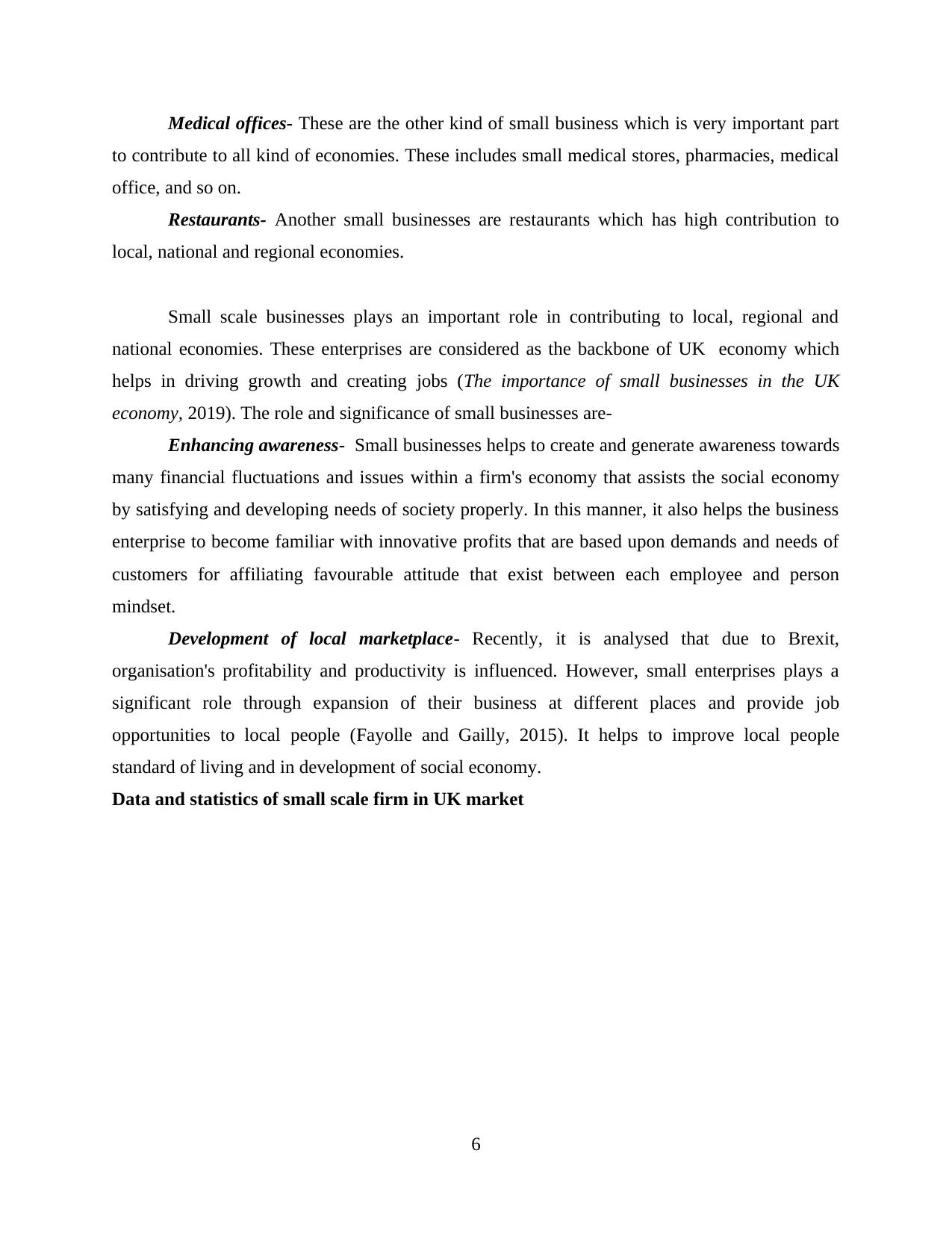
Medical offices- These are the other kind of small business which is very important part
to contribute to all kind of economies. These includes small medical stores, pharmacies, medical
office, and so on.
Restaurants- Another small businesses are restaurants which has high contribution to
local, national and regional economies.
Small scale businesses plays an important role in contributing to local, regional and
national economies. These enterprises are considered as the backbone of UK economy which
helps in driving growth and creating jobs (The importance of small businesses in the UK
economy, 2019). The role and significance of small businesses are-
Enhancing awareness- Small businesses helps to create and generate awareness towards
many financial fluctuations and issues within a firm's economy that assists the social economy
by satisfying and developing needs of society properly. In this manner, it also helps the business
enterprise to become familiar with innovative profits that are based upon demands and needs of
customers for affiliating favourable attitude that exist between each employee and person
mindset.
Development of local marketplace- Recently, it is analysed that due to Brexit,
organisation's profitability and productivity is influenced. However, small enterprises plays a
significant role through expansion of their business at different places and provide job
opportunities to local people (Fayolle and Gailly, 2015). It helps to improve local people
standard of living and in development of social economy.
Data and statistics of small scale firm in UK market
6
to contribute to all kind of economies. These includes small medical stores, pharmacies, medical
office, and so on.
Restaurants- Another small businesses are restaurants which has high contribution to
local, national and regional economies.
Small scale businesses plays an important role in contributing to local, regional and
national economies. These enterprises are considered as the backbone of UK economy which
helps in driving growth and creating jobs (The importance of small businesses in the UK
economy, 2019). The role and significance of small businesses are-
Enhancing awareness- Small businesses helps to create and generate awareness towards
many financial fluctuations and issues within a firm's economy that assists the social economy
by satisfying and developing needs of society properly. In this manner, it also helps the business
enterprise to become familiar with innovative profits that are based upon demands and needs of
customers for affiliating favourable attitude that exist between each employee and person
mindset.
Development of local marketplace- Recently, it is analysed that due to Brexit,
organisation's profitability and productivity is influenced. However, small enterprises plays a
significant role through expansion of their business at different places and provide job
opportunities to local people (Fayolle and Gailly, 2015). It helps to improve local people
standard of living and in development of social economy.
Data and statistics of small scale firm in UK market
6

The line graph which is above represents the SME gropwth in UK business in private
sector by employees number for last 18 years. In this, it is clearly shown that companies number
without any workers has been grown more than total business numbers in UK which is between
2000-2018.
7
sector by employees number for last 18 years. In this, it is clearly shown that companies number
without any workers has been grown more than total business numbers in UK which is between
2000-2018.
7
⊘ This is a preview!⊘
Do you want full access?
Subscribe today to unlock all pages.

Trusted by 1+ million students worldwide
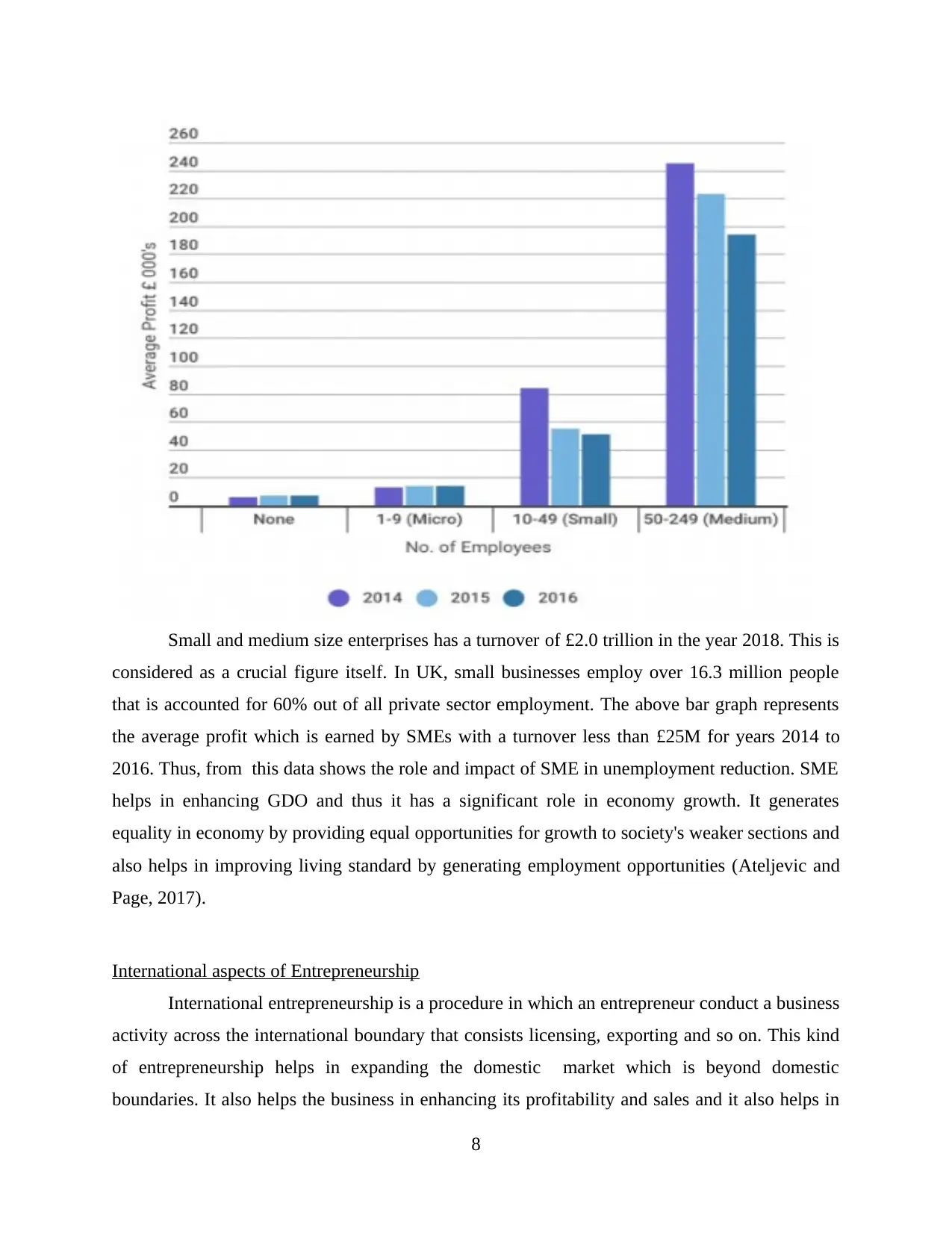
Small and medium size enterprises has a turnover of £2.0 trillion in the year 2018. This is
considered as a crucial figure itself. In UK, small businesses employ over 16.3 million people
that is accounted for 60% out of all private sector employment. The above bar graph represents
the average profit which is earned by SMEs with a turnover less than £25M for years 2014 to
2016. Thus, from this data shows the role and impact of SME in unemployment reduction. SME
helps in enhancing GDO and thus it has a significant role in economy growth. It generates
equality in economy by providing equal opportunities for growth to society's weaker sections and
also helps in improving living standard by generating employment opportunities (Ateljevic and
Page, 2017).
International aspects of Entrepreneurship
International entrepreneurship is a procedure in which an entrepreneur conduct a business
activity across the international boundary that consists licensing, exporting and so on. This kind
of entrepreneurship helps in expanding the domestic market which is beyond domestic
boundaries. It also helps the business in enhancing its profitability and sales and it also helps in
8
considered as a crucial figure itself. In UK, small businesses employ over 16.3 million people
that is accounted for 60% out of all private sector employment. The above bar graph represents
the average profit which is earned by SMEs with a turnover less than £25M for years 2014 to
2016. Thus, from this data shows the role and impact of SME in unemployment reduction. SME
helps in enhancing GDO and thus it has a significant role in economy growth. It generates
equality in economy by providing equal opportunities for growth to society's weaker sections and
also helps in improving living standard by generating employment opportunities (Ateljevic and
Page, 2017).
International aspects of Entrepreneurship
International entrepreneurship is a procedure in which an entrepreneur conduct a business
activity across the international boundary that consists licensing, exporting and so on. This kind
of entrepreneurship helps in expanding the domestic market which is beyond domestic
boundaries. It also helps the business in enhancing its profitability and sales and it also helps in
8
Paraphrase This Document
Need a fresh take? Get an instant paraphrase of this document with our AI Paraphraser
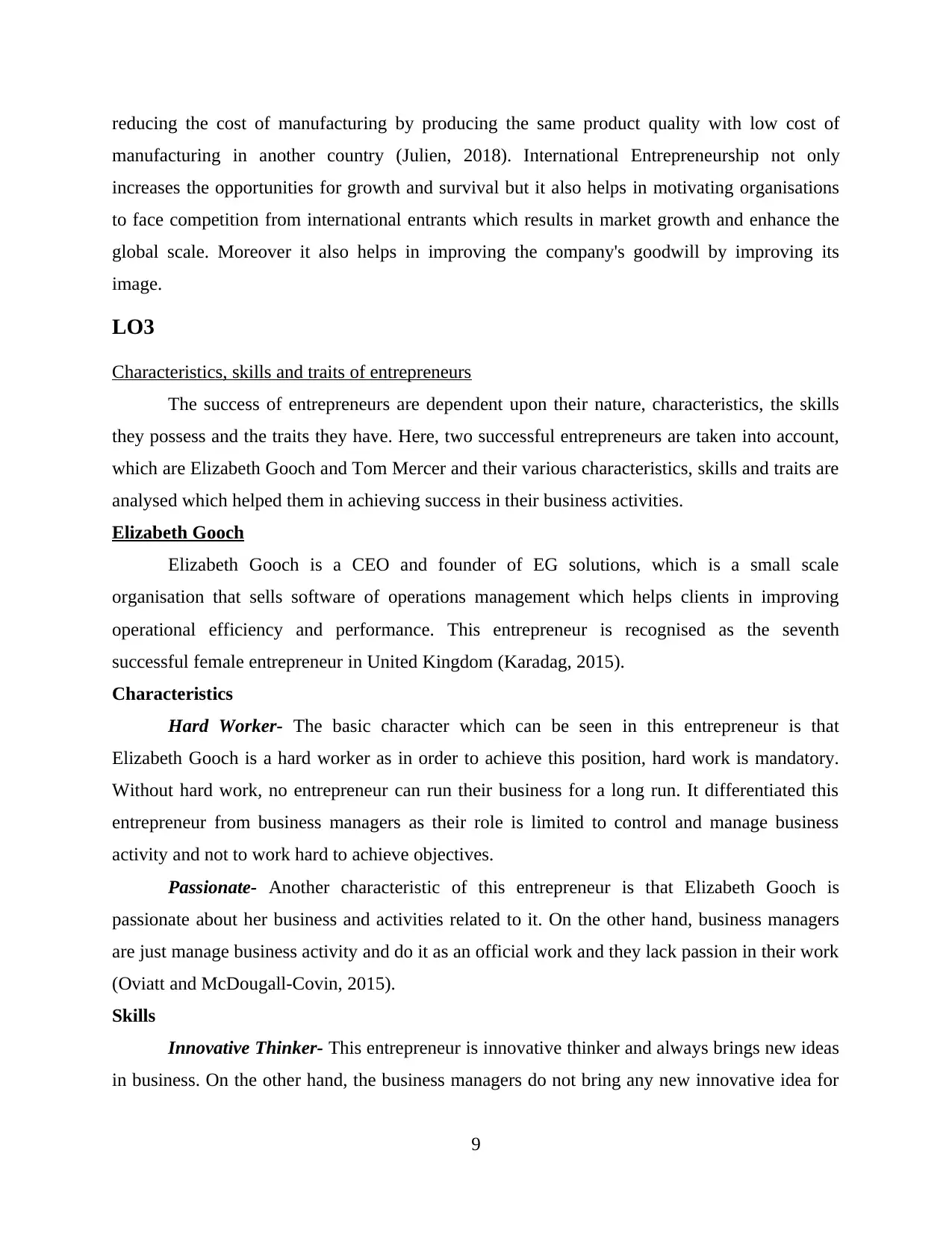
reducing the cost of manufacturing by producing the same product quality with low cost of
manufacturing in another country (Julien, 2018). International Entrepreneurship not only
increases the opportunities for growth and survival but it also helps in motivating organisations
to face competition from international entrants which results in market growth and enhance the
global scale. Moreover it also helps in improving the company's goodwill by improving its
image.
LO3
Characteristics, skills and traits of entrepreneurs
The success of entrepreneurs are dependent upon their nature, characteristics, the skills
they possess and the traits they have. Here, two successful entrepreneurs are taken into account,
which are Elizabeth Gooch and Tom Mercer and their various characteristics, skills and traits are
analysed which helped them in achieving success in their business activities.
Elizabeth Gooch
Elizabeth Gooch is a CEO and founder of EG solutions, which is a small scale
organisation that sells software of operations management which helps clients in improving
operational efficiency and performance. This entrepreneur is recognised as the seventh
successful female entrepreneur in United Kingdom (Karadag, 2015).
Characteristics
Hard Worker- The basic character which can be seen in this entrepreneur is that
Elizabeth Gooch is a hard worker as in order to achieve this position, hard work is mandatory.
Without hard work, no entrepreneur can run their business for a long run. It differentiated this
entrepreneur from business managers as their role is limited to control and manage business
activity and not to work hard to achieve objectives.
Passionate- Another characteristic of this entrepreneur is that Elizabeth Gooch is
passionate about her business and activities related to it. On the other hand, business managers
are just manage business activity and do it as an official work and they lack passion in their work
(Oviatt and McDougall‐Covin, 2015).
Skills
Innovative Thinker- This entrepreneur is innovative thinker and always brings new ideas
in business. On the other hand, the business managers do not bring any new innovative idea for
9
manufacturing in another country (Julien, 2018). International Entrepreneurship not only
increases the opportunities for growth and survival but it also helps in motivating organisations
to face competition from international entrants which results in market growth and enhance the
global scale. Moreover it also helps in improving the company's goodwill by improving its
image.
LO3
Characteristics, skills and traits of entrepreneurs
The success of entrepreneurs are dependent upon their nature, characteristics, the skills
they possess and the traits they have. Here, two successful entrepreneurs are taken into account,
which are Elizabeth Gooch and Tom Mercer and their various characteristics, skills and traits are
analysed which helped them in achieving success in their business activities.
Elizabeth Gooch
Elizabeth Gooch is a CEO and founder of EG solutions, which is a small scale
organisation that sells software of operations management which helps clients in improving
operational efficiency and performance. This entrepreneur is recognised as the seventh
successful female entrepreneur in United Kingdom (Karadag, 2015).
Characteristics
Hard Worker- The basic character which can be seen in this entrepreneur is that
Elizabeth Gooch is a hard worker as in order to achieve this position, hard work is mandatory.
Without hard work, no entrepreneur can run their business for a long run. It differentiated this
entrepreneur from business managers as their role is limited to control and manage business
activity and not to work hard to achieve objectives.
Passionate- Another characteristic of this entrepreneur is that Elizabeth Gooch is
passionate about her business and activities related to it. On the other hand, business managers
are just manage business activity and do it as an official work and they lack passion in their work
(Oviatt and McDougall‐Covin, 2015).
Skills
Innovative Thinker- This entrepreneur is innovative thinker and always brings new ideas
in business. On the other hand, the business managers do not bring any new innovative idea for
9
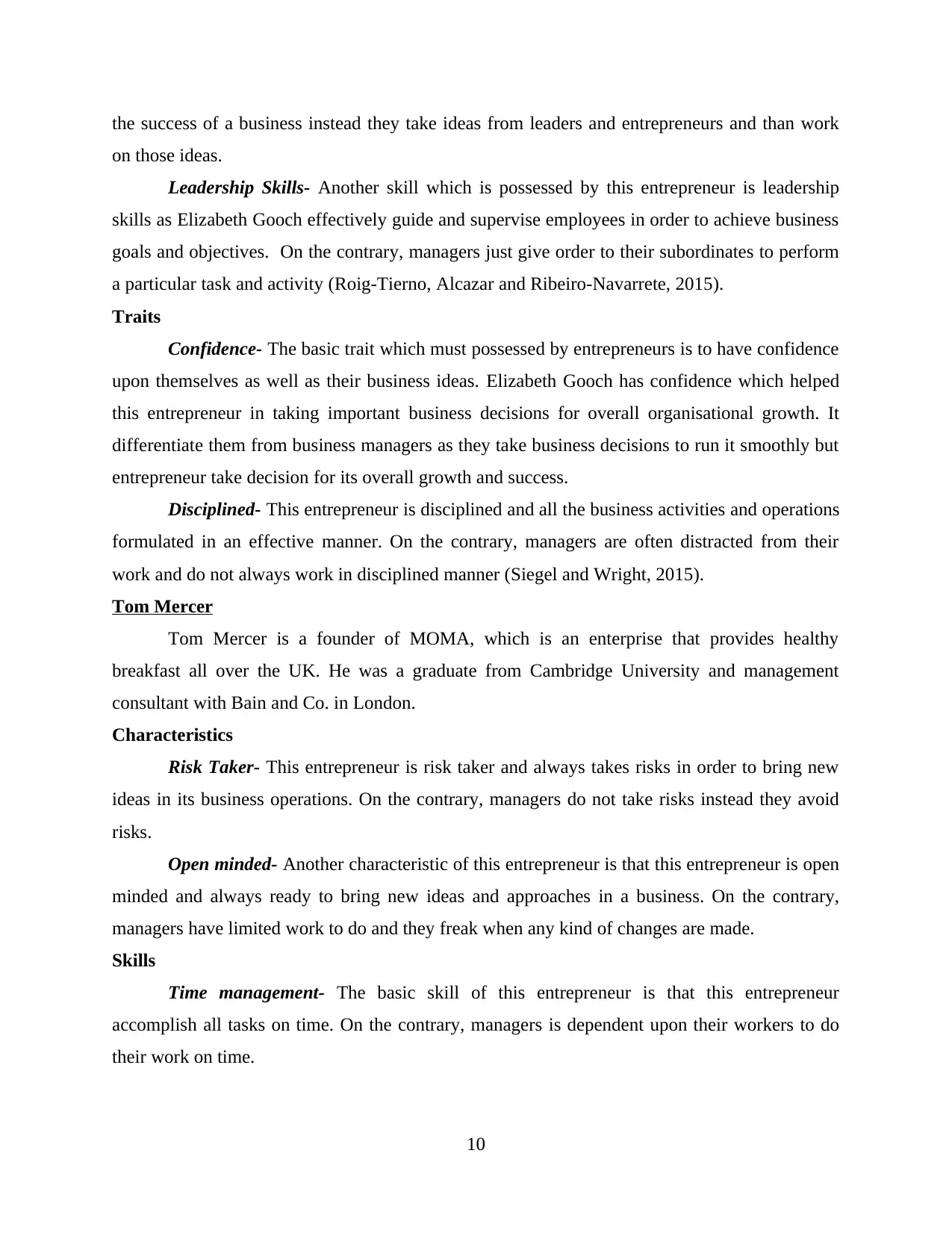
the success of a business instead they take ideas from leaders and entrepreneurs and than work
on those ideas.
Leadership Skills- Another skill which is possessed by this entrepreneur is leadership
skills as Elizabeth Gooch effectively guide and supervise employees in order to achieve business
goals and objectives. On the contrary, managers just give order to their subordinates to perform
a particular task and activity (Roig-Tierno, Alcazar and Ribeiro-Navarrete, 2015).
Traits
Confidence- The basic trait which must possessed by entrepreneurs is to have confidence
upon themselves as well as their business ideas. Elizabeth Gooch has confidence which helped
this entrepreneur in taking important business decisions for overall organisational growth. It
differentiate them from business managers as they take business decisions to run it smoothly but
entrepreneur take decision for its overall growth and success.
Disciplined- This entrepreneur is disciplined and all the business activities and operations
formulated in an effective manner. On the contrary, managers are often distracted from their
work and do not always work in disciplined manner (Siegel and Wright, 2015).
Tom Mercer
Tom Mercer is a founder of MOMA, which is an enterprise that provides healthy
breakfast all over the UK. He was a graduate from Cambridge University and management
consultant with Bain and Co. in London.
Characteristics
Risk Taker- This entrepreneur is risk taker and always takes risks in order to bring new
ideas in its business operations. On the contrary, managers do not take risks instead they avoid
risks.
Open minded- Another characteristic of this entrepreneur is that this entrepreneur is open
minded and always ready to bring new ideas and approaches in a business. On the contrary,
managers have limited work to do and they freak when any kind of changes are made.
Skills
Time management- The basic skill of this entrepreneur is that this entrepreneur
accomplish all tasks on time. On the contrary, managers is dependent upon their workers to do
their work on time.
10
on those ideas.
Leadership Skills- Another skill which is possessed by this entrepreneur is leadership
skills as Elizabeth Gooch effectively guide and supervise employees in order to achieve business
goals and objectives. On the contrary, managers just give order to their subordinates to perform
a particular task and activity (Roig-Tierno, Alcazar and Ribeiro-Navarrete, 2015).
Traits
Confidence- The basic trait which must possessed by entrepreneurs is to have confidence
upon themselves as well as their business ideas. Elizabeth Gooch has confidence which helped
this entrepreneur in taking important business decisions for overall organisational growth. It
differentiate them from business managers as they take business decisions to run it smoothly but
entrepreneur take decision for its overall growth and success.
Disciplined- This entrepreneur is disciplined and all the business activities and operations
formulated in an effective manner. On the contrary, managers are often distracted from their
work and do not always work in disciplined manner (Siegel and Wright, 2015).
Tom Mercer
Tom Mercer is a founder of MOMA, which is an enterprise that provides healthy
breakfast all over the UK. He was a graduate from Cambridge University and management
consultant with Bain and Co. in London.
Characteristics
Risk Taker- This entrepreneur is risk taker and always takes risks in order to bring new
ideas in its business operations. On the contrary, managers do not take risks instead they avoid
risks.
Open minded- Another characteristic of this entrepreneur is that this entrepreneur is open
minded and always ready to bring new ideas and approaches in a business. On the contrary,
managers have limited work to do and they freak when any kind of changes are made.
Skills
Time management- The basic skill of this entrepreneur is that this entrepreneur
accomplish all tasks on time. On the contrary, managers is dependent upon their workers to do
their work on time.
10
⊘ This is a preview!⊘
Do you want full access?
Subscribe today to unlock all pages.

Trusted by 1+ million students worldwide
1 out of 17
Related Documents
Your All-in-One AI-Powered Toolkit for Academic Success.
+13062052269
info@desklib.com
Available 24*7 on WhatsApp / Email
![[object Object]](/_next/static/media/star-bottom.7253800d.svg)
Unlock your academic potential
Copyright © 2020–2025 A2Z Services. All Rights Reserved. Developed and managed by ZUCOL.





